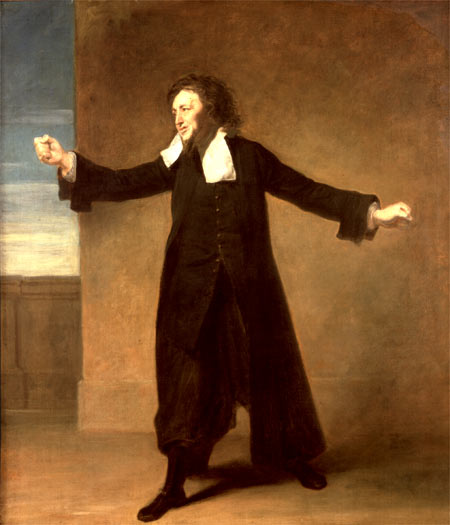Act 3, Sc. 4 – PORTIA
William Shakespeare, Merchant of Venice, Folger Shakespeare Library, London, p. 131 – 132
They shall, Nerissa; but in such a habit,
That they shall think we are accomplished
With that we lack. I’ll hold thee any wager,
When we are both accoutred like young men,
I’ll prove the prettier fellow of the two,
And wear my dagger with the braver grace,
And speak between the change of man and boy
With a reed voice, and turn two mincing steps
Into a manly stride, and speak of frays
Like a fine bragging youth, and tell quaint lies,
How honourable ladies sought my love,
Which I denying, they fell sick and died;
I could not do withal; then I’ll repent,
And wish for all that, that I had not killed them;
And twenty of these puny lies I’ll tell,
That men shall swear I have discontinued school
Above a twelvemonth. I have within my mind
A thousand raw tricks of these bragging Jacks,
Which I will practise.
– NERISSA
Why, shall we turn to men?
Acte III, Scène 4 – PORTIA
William Shakespear, Le Marchand de Venise, Le Livre de Poche, Paris, 2021, p. 123 – 124
Oui, Nerissa, mais habillées de telle manière
Qu’ils croiront que nous sommes toutes deux pourvues
De ce qui nous manque. Je parie tout ce que tu veux,
Lorsqu’on sera toutes deux déguisées en jeunes gens,
Que je serai le plus joli garçon des deux,
Portant le poignard avec plus de grâce martiale,
Ma voix flûtée étant celle d’un garçon
Avant qu’il mue, et je changerai mes deux
Petits pas en enjambées viriles; je chercherai
Noise comme un fier vantard et j’inventerai
Des histoires de belles dames qui voulurent me plaire
Et qui, face à mon refus, moururent de chagrin.
C’était plus fort que moi. Puis j’aurai des remords,
Voulant, tout, ne les avoir pas tuées;
Et je débiterai vingt mensonges semblables,
Faisant croire aux hommes que j’ai séché les cours
Pendant ces douze mois. J’ai par cœur dans la tête
Les mille et une ruses de ces petits vantards,
Et je vais en user.
– NERISSA
Quoi, on va être mises?…
En hommes?
William Shakespeare, Merchant of Venice, Folger Shakespeare Library, London, p. 131 – 132
